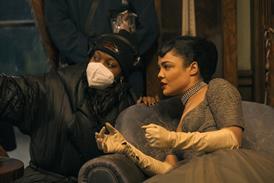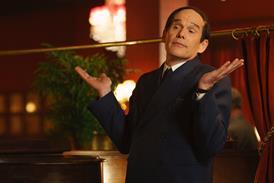Dir: Joe Roth. US. 2006.113mins.
Trying to streamline andilluminate Freedomland, Richard Price's panoramic 1998 novel,studio executive Joe Roth is working beyond his range, temperament andsensibility.
Unlike other directors whohave adapted the works of Price
Price is given soleadaptation credit, and much of the dialogue is taken directly from the novel.Price contributed to the script of Roth's first feature, the 1986 Streets OfGold. Like Lee's adaptation of Price's earlier novel Clockers, the new movierequires a great deal of pruning to produce a workable script.
Reducing the 540-page novel,the film compresses a great deal, and the cuts eliminate entirely the book'smost interesting female character, a young, ambitious journalist whoseconflicted family history complicates her own role in the telling of thenarrative. Despite the outbursts of profanity, violence, and convulsive racialtension, the film is strangely softened, particularly the tragic, pessimisticending.
These apparent commercialcalculations are unlikely to have a positive impact on the movie's financialbearing. The eight years that separate the publication of the novel withthe release of the film also lessens the urgency of the material. Sonyreleases the Revolution production on February 17 in North America, forPresidents' Day Weekend.
The companies are unlikely toreplicate the success of Joseph Ruben's 2004 sleeper hit The Forgotten ($118mworldwide), a Roth production that also featured Julianne Moore. Samuel LJackson and Moore are accomplished performers, though their track record,particularly on serious drama, is uneven. Internationally, the movie'sbest prospects are probably in television and on DVD.
Freedomland is set largely ina fictional New Jersey suburban racial tinderbox known as the Armstrong housingprojects that in the novel and film feel inseparable from a concentration camp.The racial divide is the abutting town, the ethnic, lower middle class whitecommunity called Gannon. On a hot May night, the two worlds collide when BrendaMartin (Moore), a 37-year-old white single mother from Gannon walks dazed andbloodied into a hospital.
Claiming she was carjacked bya black man, Brenda creates a far-ranging firestorm in declaring herfour-year-old son Cody (Sherman) was left sleeping in the backseat.
Lorenzo Council (Jackson),known as Big Daddy, is the detective assigned the case, and he marshals policeresources and his own forensic talent to determine the veracity of Brenda'sclaims. Given his own tortured background (his own adult son is incarcerated),Lorenzo must navigate a minefield of explosive unrest, caught between the blackhousing residents who feel abused and mistreated and an aggressive mediapresence and politically motivated police command that wants resolution and theboy found.
Complicating matters,Brenda's ill-tempered brother Danny (Eldard), is a Gannon police detectivepursuing his own brand of vigilante justice. The final major player, Karen(Falco), leads a local advocacy group that attempts to locate missing children.
The novel easily accommodatedso many shifting points of view. By contrast, the movie is largely aprocedural, and dramatically it is less successful as a movie because of thedependence on a long interrogation scene to uncover the truth, a revelation thatmany will find wholly unsurprising.
The racial cauldron andfrayed nerves, leading to a series of physical confrontations betweenbystanders and police, is applied so thickly and incoherently, the storylurches from one explosive, hysteric action to another. The actorsare occasionally allowed to strut their stuff, showing more in the quiet,off-handed exchanges involving Moore, Jackson and Falco.
Roth frequently negates theactors' work with a mannered visual style and jerky editing rhythm that hypesthe speed and action though never shapes character, emotional revelation orimportant social detail. But from the start, shooting the scenes in thehospital as if it were a horror movie, the movie never has a convincing style.
Some of the complimentary details,such as making Council an asthmatic, feel utterly unnecessary and desperate,consistent with a movie that announces and telegraphs its ideas without everforcefully dramatizing them.
Production companies
Revolution Studios
Scott Rudin Productions
US distribution
Sony Pictures
Producer
Scott Rudin
Executive producer
Charles Newirth
Screenplay
Richard Price, based on his novel
Cinematography
Anastas M Michos
Editor
Nick Moore
Production design
David Wasco
Costumes
Ann Roth
Music
James Newton Howard
Cast
Samuel L Jackson
Julianne Moore
Edie Falco
Ron Eldard
William Forsythe
Aunjanue Ellis
Anthony Mackie
Marlon Sherman
Domenick Lombardozzi
Aasif Mandvi

















No comments yet